The Daguan Garden is under renovation and maintenance and is temporarily closed. We apologize for any inconvenience caused.
In the southwest corner of Tongli Lakeview Hotel lies a waterside garden built in the traditional residential style of Tongli, Suzhou. The garden and the hotel’s main building are named "Daguan", inspired by the poetic line "Examining the profound through the divine, understanding all things with a broad perspective.” The name embodies both intellectual clarity and adaptability to life’s circumstances.
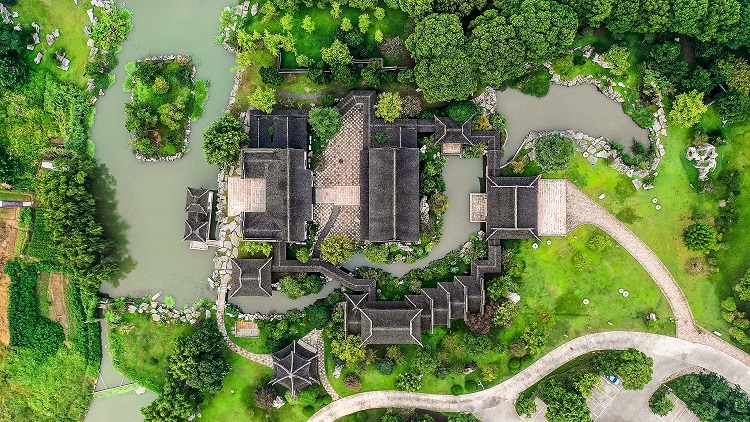
The pavilions and structures within the garden are named and inscribed by renowned Taiwanese writer Mr. Zhang Dachun, using traditional Chinese characters. Three decorative seals feature the phrases: A heart as bold and free as in youth; Year after year, the fragrant promise of red plums goes unfulfilled; Most beloved are the misty moons over Six Bridges”.
![2356352].jpg 2356352].jpg](http://www.tonglilakeviewhotel.com/Content/upload/image/20200919/6373611996965594437641926.jpg)
A couplet is pasted on the entrance: "Grand verses fill Wujiang, where singing stones welcome celestial guests; Joyful journeys thrive in Tongli, where flowers dance with fish in spring lakes." This couplet captures the hotel’s essence: unique stones, beautiful flowers, lake vistas, fish gliding through waters. Nowadays, the garden is a place of exhibition and teahouse for hotel's guests.
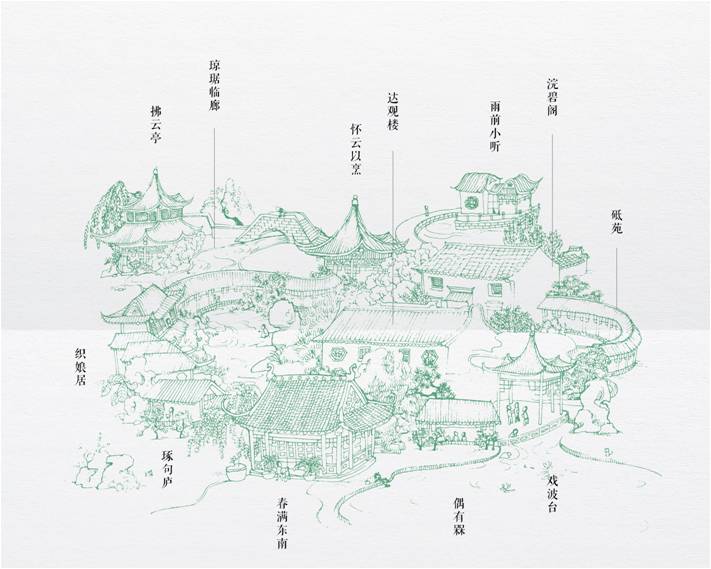
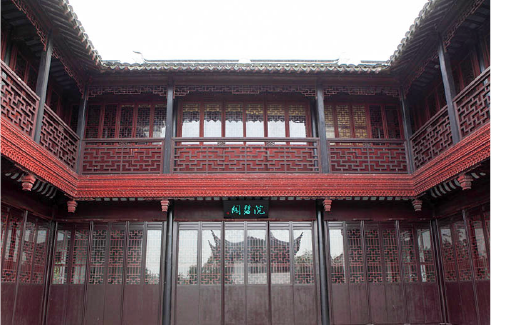
Green-Laundering House (Book & Tea)
"浣" means launder in Chinese. "碧" means clean water in Chinese, and in Chinese culture, we always describes clean water as green water. This Green-Laundering Pavilion is facing the Tongli Lake, it is a place for you and your dearest ones to enjoy tea and the peace.
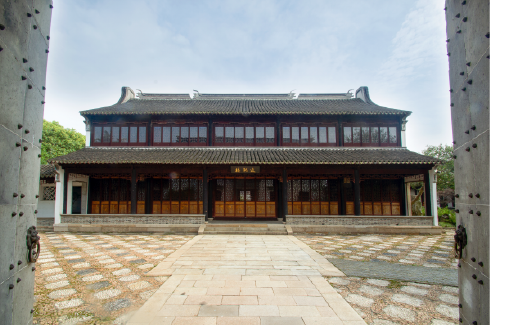
Daguan Mansion
On the central of the garden. "Daguan" as the name of the garden signifies a man's well-known of the world and knowledge, it also has a meaning of "to take the world as it is".
It is an elegant cultural venue designed for performances, gatherings, intimate meetings, and banquets.
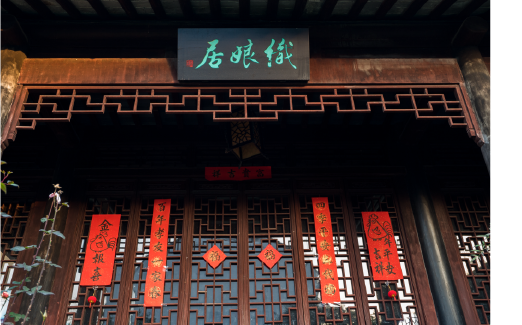
The Weaving Lady Cottage
"Men farm and Women weave" is a beautiful picture in Chinese people's mind when they think about a wonderful family. There's a famous fairy tale about the weaving lady's love story. The weaving lady also became a guardian of couples, women and children. Typically served as the room for unmarried young women.
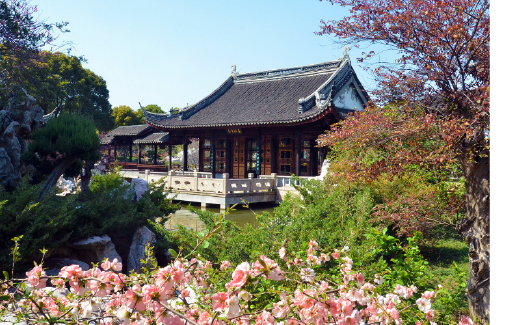
Spring Comes to South-East
The famous calligraphist from Song dynasty MiFu had wrote a famous poem about the view of the Chuihong Bridge in Wujiang has been destroyed. The Chuihong Bridge in the poem resonates with the Chuihong pavilion in the other side of the hotel. The character 'Chun' (春) is rendered in a unique calligraphic style distinctive to Zhang Dachun's signatures.
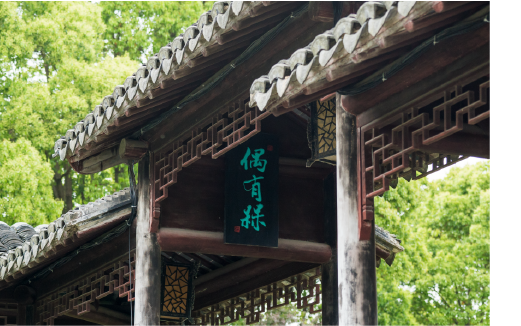
Plum Blossom in Occasion
"槑" is an ancient word of plum in Chinese. Plum is reckoned by Chinese as a divine plant, because of it can survive through cold winter and having an elegant form when it blossoms. There are two plum (wintersweet) trees in the corridor, it only blossoms about 2-3 months within the whole year, the fragrance spreads in the yard when in its blossom season.
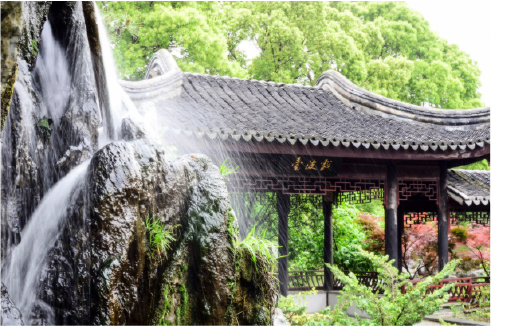
Xibo Terrace (Pavilion of Playful Ripples)
A waterside pavilion where one can both playfully observe fish and ripples, and enjoy performances. "To unravel worries, seek here; To contemplate the waves is to dance with them." Pause a moment, let worldly troubles fade.
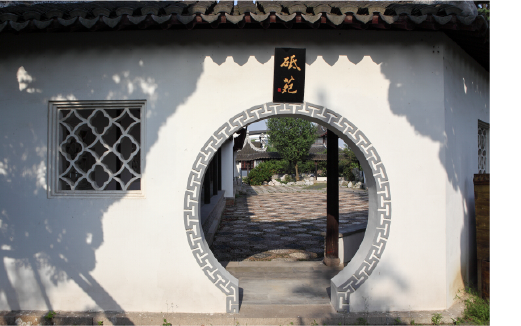
Di Yard
Di (砥), a fine-grained whetstone. The garden is adorned with uniquely shaped rocks, each placed with intention, symbolizing the tempering of character, which is to convey the idea of grinding one's behavior to perfection, having the endurance of being honest and fair to the world.
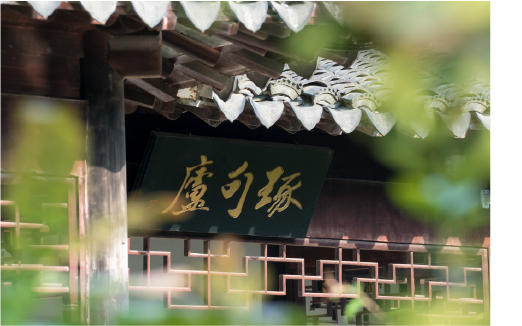
Zhuoju Cottage
"Carving jade is called zhuo (琢), and shaping stone is termed mo (磨). Just as jade and stone require meticulous carving and polishing, so too must literary works be refined through relentless revision—hence the phrase zhuoju (琢句), 'crafting sentences.' Within this four-chamber cottage, one may contemplate stones and artistry.
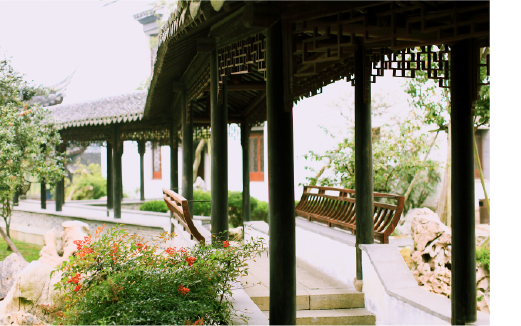
Fine Jade Corridor
A sentence from famous Shijing "Giving me great fruit, returning back with fine jade." The fruit that has mentioned in Shijing is now planted right beside the corridor. Using this name for the corridor is to bring out the spirit of treating each other with respect. The quince mentioned in this ancient verse grows beside the corridor—distinct from the tropical papaya known today. The corridor itself bears the resonant name "Qiongju Linlang". When walking and looking out at the scenery, everything is wonderful.
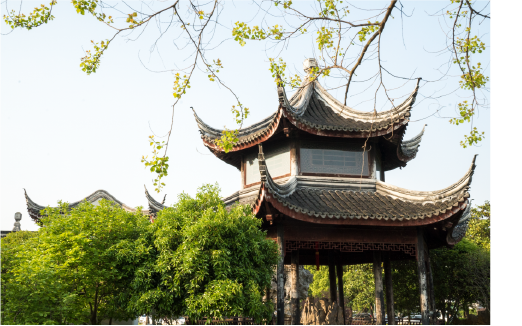
Clouds-Brushing Pavilion
There is a tall pavilion outside the garden, named Fuyun Pavilion. Du Fu once wrote in his poem, "As long as it is not pruned or cut down, it will surely grow tall enough to touch the clouds." Sitting here quietly to enjoy the scenery, one can smoke and seem to hold the blue sky and white clouds gently, while brushing away the worldly cares. This is the smoking area.
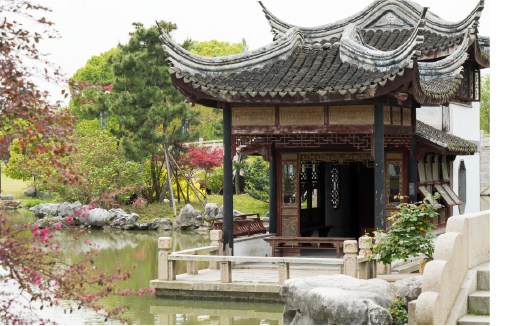
Sping-Rain-Listening
Yuqian tea—harvested from tender tea buds just after Qingming Festival and before Guyu Festival (late April to early May)—is the finest spring tea, celebrated for its delicate flavor and fresh aroma. Yuqian Xiaoting, a "dry boat pavilion" is a landlocked pavilion shaped like a boat, offers the perfect retreat to listen to the crisp rhythm of raindrops on stone steps and taste the nectar of this seasonal treasure.

Boiling Over the Clouds
The pavilion is facing the clouds-brushing pavilion. It is a great place for you to enjoy the views of beautiful clouds and views of the garden. Having a peace of mind in your leisure time.

